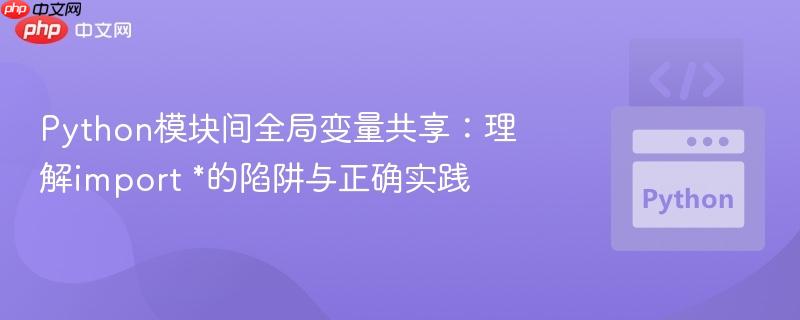
在python开发中,尤其是在构建包含多个模块的应用程序时,管理和共享全局状态是一个常见需求。然而,不恰当的模块导入方式可能导致变量作用域问题,使得看似全局的变量在不同模块中表现不一致。
一个典型的例子是使用from module import *语句。当一个模块(例如playlist.py)从另一个模块(例如globals.py)导入变量时,如果使用from globals import *,Python会将globals.py中定义的所有公共名称(包括变量selectedSong)复制到playlist.py的命名空间中。这意味着playlist.py现在拥有了selectedSong的一个独立副本。
考虑以下场景:
这就是为什么在generatePlaylist函数内部打印selectedSong显示更新后的值,而在playButton函数内部打印却依然是None的原因。每个模块都在操作自己的变量副本,而非共享同一个全局实例。
要确保所有模块都访问并修改同一个全局变量实例,应采用直接导入模块并以点号方式访问变量的方法。即,使用import module而不是from module import *。
立即学习“Python免费学习笔记(深入)”;
当使用import globals时,Python会将globals.py模块本身作为一个对象导入到当前模块的命名空间中。此时,要访问globals.py中定义的selectedSong变量,你需要通过globals.selectedSong来引用它。
通过这种方式,所有导入了globals模块并使用globals.selectedSong的模块,都将引用globals模块对象内部的同一个selectedSong变量。任何对globals.selectedSong的修改都将反映在所有引用它的地方,从而实现真正的全局变量共享。
让我们根据上述原则,修正原始代码中的变量访问方式。
import pygame as Py selectedSong = None
import globals # 修改点:直接导入globals模块
import os
import pygame as Py # 假设Pygame在这里也被使用,或者从其他地方导入screen
# 假设screen对象在某个地方被定义并可访问,例如从main.py传入或作为真正的全局变量
# screen = Py.display.set_mode((800, 600)) # 示例,实际应在main.py中初始化
songs = os.listdir('./assets/songs')
def generatePlaylist(font, event, screen): # 假设screen作为参数传入
for index, song in enumerate(songs):
rectIndex = Py.Rect(20, 25 + (50 * (index + 1)), 260, 40)
rectIndexPosition = (20, 25 + (50 * (index + 1)))
rectIndexWidth = 260
rectIndexHeight = 40
Py.draw.rect(screen, 'gray', rectIndex)
text_surface = font.render(song, True, (0, 0, 0))
text_rect = text_surface.get_rect(center=rectIndex.center)
screen.blit(text_surface, text_rect)
selected = selection(event, rectIndexPosition, rectIndexWidth, rectIndexHeight, song)
if selected is not None:
globals.selectedSong = selected # 修改点:通过globals.selectedSong访问
print(f"Playlist updated: {globals.selectedSong}") # 打印确认
if index == len(songs) - 1:
# ... 其他绘制逻辑 ...
pass # 保持原样,或根据需要修正
def selection(event, rectIndexPosition, rectIndexWidth, rectIndexHeight, song):
if event.type == Py.MOUSEBUTTONUP:
if rectIndexPosition[0] <= event.pos[0] <= rectIndexPosition[0] + rectIndexWidth and \
rectIndexPosition[1] <= event.pos[1] <= rectIndexPosition[1] + rectIndexHeight:
return(song)
return None 注意: screen对象在原始代码中未明确定义其来源,这里假设它作为参数传入generatePlaylist函数,或者在main.py中初始化后作为真正的全局变量(同样需要通过globals.screen方式访问,如果它被定义在globals.py中)。
import globals # 修改点:直接导入globals模块
# from musicFunction import * # 保持不变,如果musicFunction中的变量没有类似问题
import pygame.mixer as mx # 假设mx在这里被使用
# 假设imagePlayPosition和imagePlay在某个地方被定义并可访问
# 例如:
# imagePlay = Py.image.load('path/to/play_button.png')
# imagePlayPosition = (x, y)
def play(): # 假设play函数定义在musicFunction.py中
# 此处需要确保mx已初始化,例如在main.py中Py.mixer.init()
mx.music.load(f'./assets/songs/{globals.selectedSong}') # 修改点:通过globals.selectedSong访问
mx.music.play()
def playButton(event):
if event.type == Py.MOUSEBUTTONDOWN:
# 假设imagePlayPosition和imagePlay是可访问的
if imagePlayPosition[0] <= event.pos[0] <= imagePlayPosition[0] + imagePlay.get_width() and \
imagePlayPosition[1] <= event.pos[1] <= imagePlayPosition[1] + imagePlay.get_height():
print(f"Play button clicked. Selected song: {globals.selectedSong}") # 修改点:通过globals.selectedSong访问
if globals.selectedSong is not None: # 修改点:通过globals.selectedSong访问
play()注意: imagePlayPosition和imagePlay在原始代码中未明确定义,这里假设它们在buttonMusic.py或其他导入的模块中是可访问的。play()函数在原始问题中位于musicFunction.py,但为了演示方便,这里将其定义在buttonMusic.py中,并修正其对selectedSong的引用。如果play()确实在musicFunction.py中,那么musicFunction.py也需要进行类似的import globals和globals.selectedSong的修改。
main.py也需要确保正确导入globals模块,如果它直接或间接访问selectedSong。在原始代码中,main.py已经使用了import globals,这是正确的。
import pygame as Py
from render import *
from buttonMusic import *
from playlist import *
import globals # 保持不变,但确认是import globals而非from globals import *
import os
Py.init()
Py.mixer.init() # 初始化混音器
# 假设screen对象在这里被初始化
screen = Py.display.set_mode((800, 600)) # 示例尺寸,根据实际需要调整
continuer = True
script_folder = os.path.dirname(os.path.abspath(__file__)) # 获取当前脚本所在目录
# 修正字体路径,确保它是相对于脚本的正确路径
font_path = os.path.join(script_folder, 'assets', 'font', 'Roboto-Black.ttf')
font = Py.font.Font(font_path, 18)
# 在这里初始化 imagePlay 和 imagePlayPosition,以便 buttonMusic.py 可以访问
# 或者将它们也放在 globals.py 中,然后通过 globals.imagePlay 访问
imagePlay = Py.image.load(os.path.join(script_folder, 'assets', 'play.png')) # 示例图片路径
imagePlayPosition = (100, 100) # 示例位置
while continuer:
render(font, screen) # 假设render也需要screen
for event in Py.event.get():
if event.type == Py.QUIT:
continuer = False
generatePlaylist(font, event, screen) # 传入screen
reculeButton(event)
randomButton(event)
playButton(event) # playButton现在会访问到正确的globals.selectedSong
pauseButton(event)
stopButton(event)
advanceButton(event)
loopButton(event)
upButton(event)
downButton(event)
muteButton(event)
Py.display.flip() # 更新屏幕显示
Py.quit()正确理解Python的模块导入机制对于编写健壮、可维护的代码至关重要。通过从from module import *转向import module并使用module.variable_name的方式,可以有效避免因变量副本导致的全局状态不同步问题。在设计应用程序时,应权衡全局变量的便利性与代码结构、可维护性之间的关系,并优先选择更清晰、更易于管理的状态共享方案。
以上就是Python模块间全局变量共享:理解import *的陷阱与正确实践的详细内容,更多请关注php中文网其它相关文章!

每个人都需要一台速度更快、更稳定的 PC。随着时间的推移,垃圾文件、旧注册表数据和不必要的后台进程会占用资源并降低性能。幸运的是,许多工具可以让 Windows 保持平稳运行。

Copyright 2014-2025 https://www.php.cn/ All Rights Reserved | php.cn | 湘ICP备2023035733号